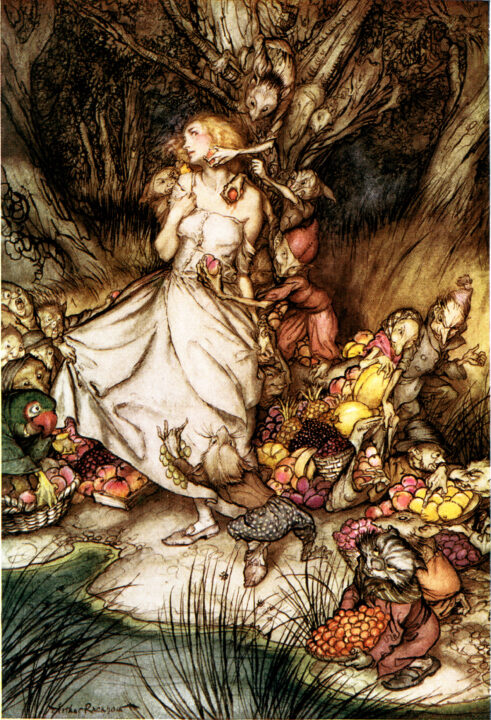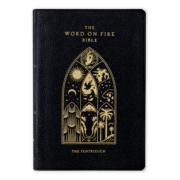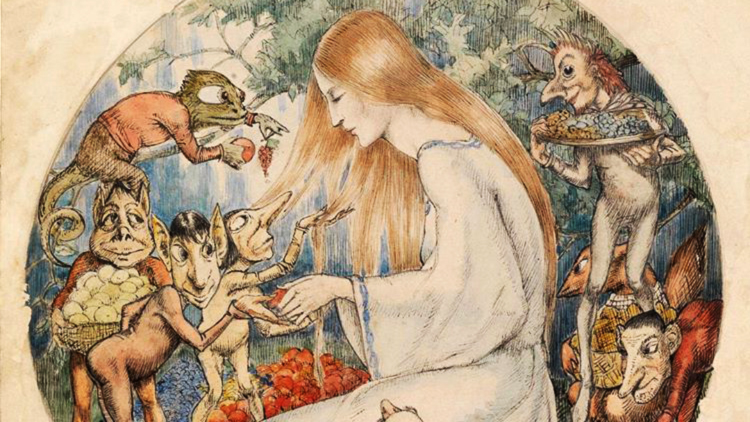The month of October impels people to dwell upon fearful things. As days grow shorter and darkness inhabits more of our waking hours, the human mind yearns to ponder the darkness and everything darkness connotes. Many generations now have had consistent recourse to Gothic literature to meet this yearning. Dracula, Sleepy Hollow, Frankenstein, the writings of Poe and Goethe, and all their many iterations and descendants appeal to the masses perennially. Among the treasures of this creepy tradition stands the Victorian poet Christina Rossetti and her defining narrative poem “Goblin Market.”
“Goblin Market” follows two sisters, Laura and Lizzie, in their encounters with goblin men who lurk about the countryside peddling a cornucopia of exotic and delicious fruits. The goblins’ appearance is beastly and repulsive:
One had a cat’s face,
One whisked a tail,
One tramped at a rat’s pace,
One crawled like a snail,
One like a wombat prowled obtuse and furry,
One like a ratel tumbled hurry skurry.
Lizzie preserves the innocence Laura had so easily surrendered and consequently paid the true price for the unearned fruit.
Every day, Laura and Lizzie hear the goblins calling out their list of goods that exudes sheer, sensual abundance:
Come buy, come buy:
Apples and quinces,
Lemons and oranges,
Plump unpecked cherries,
Melons and raspberries,
Bloom-down-cheeked peaches,
Swart-headed mulberries,
Wild free-born cranberries,
Crab-apples, dewberries,
Pine-apples, blackberries,
Apricots, strawberries
and so on and so on; the list never seems to end. The goblins, with “a voice like voice of doves / Cooing all together,” boast that their fruits are “sweet to tongue and sound to eye,” reminiscent of the fruit that allured Eve in the Garden of Eden (Gen. 3:6). Every night, the sisters draw close to hear the goblins go about their work, and they wade in those first, shallow waters of temptation. On one fateful night, their engagement with the goblins mimics that of the two sons when their father asks them to work in the vineyard (Matt. 21:28–32). Laura first chides Lizzie:
“We must not look at goblin men,
We must not buy their fruits:
Who knows upon what soil they fed
Their hungry thirsty roots?”
Only a few lines later, Lizzie in turn chides Laura, as the lines imply that Laura is slowly being overcome:
“Oh,” cried Lizzie, “Laura, Laura,
You should not peep at goblin men.”
Lizzie covered up her eyes,
Covered close lest they should look;
Laura reared her glossy head,
And whispered like the restless brook . . .
“How fair the vine must grow
Whose grapes are so luscious;
How warm the wind must blow
Thro’ those fruit bushes.”

Lizzie, at her breaking point, turns and flees the scene, and Laura continues to succumb to the goblins’ delightful beckoning. At once aware of her presence, they all begin to pounce, mongering her incessantly. Laura confesses that she has no money to buy the fruits, and the goblins reveal in their response that they are no ordinary merchants: “‘You have much gold upon your head,’ / They answered all together: / ‘Buy from us with a golden curl.’” Powerless, Laura surrenders a lock of hair and dives headlong into the banquet of fruits, which prove to be exactly as the goblins promised: “Sweeter than honey from the rock, / Stronger than man-rejoicing wine.” She is ravenous, gorging on fruit until there is nothing left, and by the time she is finished, utterly delirious, the goblins have long abandoned her. “She sucked until her lips were sore . . . / And knew not was it night or day / As she turned home alone.” When Laura reunites with Lizzie, Lizzie naturally rebukes her, but Laura hardly listens, obsessing helplessly over the fruit.
The sisters continue their usual life the next day, with one difference:
Lizzie with an open heart,
Laura in an absent dream,
One content, one sick in part;
One warbling for the mere bright day’s delight,
One longing for the night.
The night comes, and Laura awaits the customary clamor of the goblins with relish. But to her horror, Lizzie claims that she hears the goblins and exhorts Laura to return home with her, while Laura, despite her lingering and pining, hears nothing at all. They both retire to bed, but Laura’s plight quickly dawns on her and tortures her soul:
Must she no more such succous pasture find,
Gone deaf and blind?
Her tree of life drooped from the root:
She said not one word in her heart’s sore ache . . .
Silent till Lizzie slept;
Then sat up in a passionate yearning,
And gnashed her teeth for baulked desire, and wept
As if her heart would break.
Days go by, and Laura continues to hear nothing, and in fact, she slowly deteriorates, her very life force slowly draining. “She dwindled, as the fair full moon doth turn / To swift decay and burn / Her fire away.” Lizzie quickly realizes that her sister is dying and resolves immediately to go and procure the goblins’ fruit, hoping that tasting the fruit again will heal her. She finds the goblins where they have always been, and when she confronts them, their demeanor is eerily sinister:
Laughed every goblin
When they spied her peeping:
Came towards her hobbling,
Flying, running, leaping,
Puffing and blowing,
Chuckling, clapping, crowing,
Mopping and mowing,
Full of airs and graces,
Pulling wry faces,
Demure grimaces.
Lizzie, resolute, offers money to the goblins, but instead they invite her to dine on the fruit, just as Laura did. Lizzie remains steadfast and insists on paying for the fruit so she can give it to Laura. All at once, they turn on her and attack her and attempt to force her to eat the fruit, betraying their authentic, horrifying nature.
Lashing their tails
They trod and hustled her,
Elbowed and jostled her,
Clawed with their nails,
Barking, mewing, hissing, mocking,
Tore her gown and soiled her stocking,
Twitched her hair out by the roots,
Stamped upon her tender feet,
Held her hands and squeezed their fruits
Against her mouth to make her eat.
Both those who suffer heavily from others’ sins and those who have experienced liberation from their own sins know keenly both how dreadful the elements of sin truly are and how sweet the reality of deliverance is.

They attack to no avail, as Lizzie resists their buffets and abuse with tightened lips and even “laughs in her heart” as the juice from the fruit spills over her. Vanquished, the goblins scurry in every direction, and in a few moments Lizzie is alone, just as her sister was, but in her case totally triumphant. She goes in haste to Laura and entreats her to taste the dripping juice, her words heavy with sentiments of Eucharistic immolation, imitating the kind of discourse found in the Song of Songs:
“Eat me, drink me, love me;
Laura, make much of me:
For your sake I have braved the glen
And had to do with goblin merchant men.”
Laura, raised from her stupor by her fear that Lizzie also gave in to the goblins, rushes to suck the juice off her skin. This time, the juice is “wormwood to her tongue” and “she loathed the feast,” but, rejuvenated by loving worry for Lizzie, she never relents until the last ounce is finished. Laura collapses from the effort, but the next morning she wakes, fully revived:
Laura awoke as in a dream,
Laughed in the innocent old way,
Hugged Lizzie but not twice or thrice;
Her gleaming locks showed not one thread of grey,
Her breath was sweet as May
And light danced in her eyes.
The poem ends with the sisters later in life as wives and mothers, recounting the wild tale to their children and praising the love that sustains sisterhood:
“For there is no friend like a sister
In calm or stormy weather;
To cheer one on the tedious way,
To fetch one if one goes astray,
To lift one if one totters down,
To strengthen whilst one stands.”
Rossetti gets right to the heart of atonement in “Goblin Market.” Lizzie preserves the innocence Laura had so easily surrendered and consequently paid the true price for the unearned fruit. The fruit won through charity and compassion is offered again to the one who first tasted it in shame, and without a doubt it is bitter, but it nevertheless proves to be the means of salvation. Rossetti’s rendering of Christian atonement has unique value given its wonderfully feminine expression: sisterly sacrificial love reflects the Christian principle that charity makes the family of God (see Matt. 12:50).

Seasons of time dedicated to meditation on narratives of horror and mystery, like All Hallows’ Eve, are helpful for stirring up a fresh and healthy dread of a spiritual malaise that is older than the hills, due to their tremendous capacity to furnish our imaginations with palpable metaphors for sin. Sin indeed is ghoulish. Both those who suffer heavily from others’ sins and those who have experienced liberation from their own sins know keenly both how dreadful the elements of sin truly are and how sweet the reality of deliverance is. How precious a gift it is to contemplate the former one evening, only to delight in the latter the following day: the Feast of All Saints.
